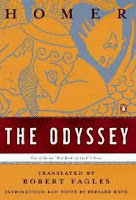The poem mainly centers on the Greek hero Odysseus (or Ulysses, as he was known in Roman myths) and his long journey home following the fall of Troy. It takes Odysseus ten years to reach Ithaca after the ten-year Trojan War.[2] In his absence, it is assumed he has died, and his wife Penelope and son Telemachus must deal with a group of unruly suitors, the Mnesteres (Greek: Μνηστῆρες) or Proci, competing for Penelope's hand in marriage.
skip to main
|
skip to sidebar
Popular Novels All Time
-
Buy This Book Sparks wrote the manuscripts for A Walk to Remember, his third novel, in the summer of 1998. He wrote it in North Carolin...
-
Buy This Book Robinson Crusoe (English pronunciation: /ˌrɒbɪnsən ˈkruːsəʊ/) is a novel by Daniel Defoe that was first published in 1719....
-
Buy This Book Online Anna Karenina (Russian: Анна Каренина; Russian pronunciation: [ˈanə kɐˈrʲenʲɪnə]) (sometimes Anglicised as Anna Kare...
-
"Vampire Diaries" are the earlier books written by L.J. Smith and, unfortunately, it shows. I enjoyed her later trilogies ...
-
Twenty-four-year-old Veronika seems to have everything -- youth and beauty, boyfriends and a loving family, a fulfilling job. But something...
-
The Name Of The Rose, the novel that sold more than fifty million copies worldwide, tells the story of a murder mystery disebuah monastery. ...
-
After almost fifty years as a wife and mother, Enid Lambert is ready to have some fun. Unfortunately, her husband, Alfred, is losing his sa...
-
Please Look After Mom (Vintage) This novel from widely acclaimed Korean author Shin focuses on motherhood and family guilt. Park So-ny...








